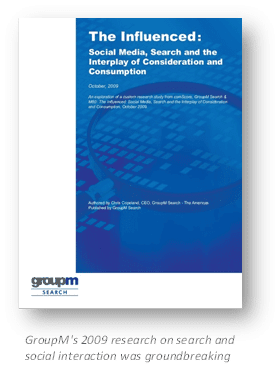
Chris was selected to lead GroupM Next after nine years of leading the search marketing practice within GroupM. Among his accomplishments includes the development and integration of the global search marketing offering for GroupM agencies, GroupM Search, which manages $1.3 billion in search billings globally and has grown to more than 1,000 search marketing strategists serving 40 countries.
Chris is an active member on advisory boards at the 4A’s, Google, Yahoo!, MSN and I-COM. He is a frequent speaker in global forums discussing the digital marketplace, and contributes editorial commentary regularly to Advertising Age, ClickZ, MediaPost and MediaBizBloggers.com. In fall 2013, Chris was honored as an inductee into the ClickZ Digital Hall of Fame.
You were one of the first to research the synergy between search and social just as social media was breaking through as a major marketing channel. What do you feel were the key takeaways from that research?
Copeland: In some ways, our research put validity to what the industry was just starting to 
Have any of those insights changed (strengthened, debunked, or transformed) over the past few years as social advertising has matured?
I certainly think consumers are more comfortable weaving the channels together. There’s no hesitation to ask Google, Facebook, Pinterest or other sources for suggestions. When we first did the research, I told groups to expect the overlap to get stronger, and I absolutely think that has happened.
What I didn’t expect was the role anonymous social recommendations would play. You could see a willingness with Yelp to take the counsel of strangers into decision making, but with Twitter and Pinterest this has exploded. I think Google has shifted, in many ways from discovery to delivery. The massive explosion of PLAs (now Google Shopping) and the rise of mobile search spending suggest that people execute via Google even if they don’t start there nearly as often as they might have when we did the research initially.
Today, where do you feel an integrated search and social approach should fit in the overall media plan?
At the end of the day these channels have, in many ways, aligned their interests with each other as it pertains to brands. Search has always been a combination of optimizing content for discovery and paying to ensure a direct path exists. Savvy brands have built assets, usually pages within sites, to ensure people could find them regardless of the query or results.
Well, it turns out social isn’t much different.
We got deep into the Paid, Owned, and Earned talk for a while based on how Facebook was building. And while earned has a place, it’s now a much more quantified place. That leaves us with paid and owned; brand content that needs to be optimized for consumption and paid investment required either to extend the reach of those assets or to create interest where it might not otherwise exist.
Brands using social listening tools to alter keyword lists and budgets in search are becoming something of a norm, but it’s pretty basic. What excites me are things like cross-channel asset creation discussions where evaluations are made about what is needed based on cost, reach and impact. This was not even on the table a year ago. What it means for organizations is really interesting. If the world can be oversimplified into optimization and acquisition, then we can start to transform our staff structure. That provides tremendous upsides not only for our clients who get more efficient and informed staff, but it also changes our proposition and creates a tremendous opportunity for people working in this industry.
“What excites me are things like cross-channel asset creation discussions where evaluations are made about what is needed based on cost, reach and impact. This was not even on the table a year ago.”
How does GroupM articulate the benefits of integrating search and social to its clients?
Agencies have many responsibilities to their clients, but brands want competitive advantage and efficiencies above almost everything else. Any proposition, especially one where you bring disciplines together, has to deliver some market advantage over the competition. So, our discussion with clients about the benefits starts with the advantages we believe it creates, the benefits they should see, and the proof we have seen through work for others.
Cross-channel integration isn’t always easy. What are some of the challenges your teams have faced and how have you solved them?
Once you make the commitment, it’s actually not that difficult. If people buy into the why, the how can be solved. Yes, consistent language and approach are essential but that’s plumbing in comparison to deciding to build the house. We think this is a major opportunity for brands and our enthusiasm speaks volumes with our clients. They see the passion and internal commitment which energizes their own organization. When that happens the burden becomes delivery at scale, which is the place we’d like to be in because we know we will win if put into that position.
Part of your job is to plan for 3-5 years out. What’s the future of search and social synergy?
Discovery and sharing will happen in ways we have not even thought about on devices we never considered to be especially well suited for search or social connections. I think the entire experience of searching and sharing will be much more passive. I think the machine learning advances in the next few years will make it so the entire process will feel very natural and precise. Google’s original value proposition was around organization and relevancy. In five years, relevancy will be completely reimagined with people being frustrated by targeting that today would feel genius in its precision. But, the biggest change will be in the interconnectivity of our devices from home to work to play, and what that does for us in providing greater utility.
